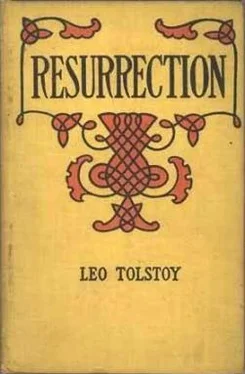Leo Tolstoy - Resurrection
Здесь есть возможность читать онлайн «Leo Tolstoy - Resurrection» весь текст электронной книги совершенно бесплатно (целиком полную версию без сокращений). В некоторых случаях можно слушать аудио, скачать через торрент в формате fb2 и присутствует краткое содержание. Жанр: Русская классическая проза, на английском языке. Описание произведения, (предисловие) а так же отзывы посетителей доступны на портале библиотеки ЛибКат.
- Название:Resurrection
- Автор:
- Жанр:
- Год:неизвестен
- ISBN:нет данных
- Рейтинг книги:4 / 5. Голосов: 1
-
Избранное:Добавить в избранное
- Отзывы:
-
Ваша оценка:
- 80
- 1
- 2
- 3
- 4
- 5
Resurrection: краткое содержание, описание и аннотация
Предлагаем к чтению аннотацию, описание, краткое содержание или предисловие (зависит от того, что написал сам автор книги «Resurrection»). Если вы не нашли необходимую информацию о книге — напишите в комментариях, мы постараемся отыскать её.
Resurrection — читать онлайн бесплатно полную книгу (весь текст) целиком
Ниже представлен текст книги, разбитый по страницам. Система сохранения места последней прочитанной страницы, позволяет с удобством читать онлайн бесплатно книгу «Resurrection», без необходимости каждый раз заново искать на чём Вы остановились. Поставьте закладку, и сможете в любой момент перейти на страницу, на которой закончили чтение.
Интервал:
Закладка:
The secretary came in and brought some document.
“Thanks, very much,” said the president, lighting a cigarette.
“Which case shall we take first, then?”
“The poisoning case, I should say,” answered the secretary, with indifference.
“All right; the poisoning case let it be,” said the president, thinking that he could get this case over by four o’clock, and then go away. “And Matthew Nikitich; has he come?”
“Not yet.”
“And Breve?”
“He is here,” replied the secretary.
“Then if you see him, please tell him that we begin with the poisoning case.” Breve was the public prosecutor, who was to read the indictment in this case.
In the corridor the secretary met Breve, who, with up lifted shoulders, a portfolio under one arm, the other swinging with the palm turned to the front, was hurrying along the corridor, clattering with his heels.
“Michael Petrovitch wants to know if you are ready?” the secretary asked.
“Of course; I am always ready,” said the public prosecutor. “What are we taking first?”
“The poisoning case.”
“That’s quite right,” said the public prosecutor, but did not think it at all right. He had spent the night in a hotel playing cards with a friend who was giving a farewell party. Up to five in the morning they played and drank, so he had no time to look at this poisoning case, and meant to run it through now. The secretary, happening to know this, advised the president to begin with the poisoning case. The secretary was a Liberal, even a Radical, in opinion.
Breve was a Conservative; the secretary disliked him, and envied him his position.
“Well, and how about the Skoptzy?” [3] a religious sect
asked the secretary.
“I have already said that I cannot do it without witnesses, and so I shall say to the Court.”
“Dear me, what does it matter?”
“I cannot do it,” said Breve; and, waving his arm, he ran into his private room.
He was putting off the case of the Skoptzy on account of the absence of a very unimportant witness, his real reason being that if they were tried by an educated jury they might possibly be acquitted.
By an agreement with the president this case was to be tried in the coming session at a provincial town, where there would be more peasants, and, therefore, more chances of conviction.
The movement in the corridor increased. The people crowded most at the doors of the Civil Court, in which the case that the dignified man talked about was being heard.
An interval in the proceeding occurred, and the old woman came out of the court, whose property that genius of an advocate had found means of getting for his client, a person versed in law who had no right to it whatever. The judges knew all about the case, and the advocate and his client knew it better still, but the move they had invented was such that it was impossible not to take the old woman’s property and not to hand it over to the person versed in law.
The old woman was stout, well dressed, and had enormous flowers on her bonnet; she stopped as she came out of the door, and spreading out her short fat arms and turning to her advocate, she kept repeating. “What does it all mean? just fancy!”
The advocate was looking at the flowers in her bonnet, and evidently not listening to her, but considering some question or other.
Next to the old woman, out of the door of the Civil Court, his broad, starched shirt front glistening from under his low-cut waistcoat, with a self-satisfied look on his face, came the celebrated advocate who had managed to arrange matters so that the old woman lost all she had, and the person versed in the law received more than 100,000 roubles. The advocate passed close to the old woman, and, feeling all eyes directed towards him, his whole bearing seemed to say: “No expressions of deference are required.”
VII
The officials of the court.
At last Matthew Nikitich also arrived, and the usher, a thin man, with a long neck and a kind of sideways walk, his nether lip protruding to one side, which made him resemble a turkey, came into the jurymen’s room.
This usher was an honest man, and had a university education, but could not keep a place for any length of time, as he was subject to fits of drunkenness. Three months before a certain countess, who patronised his wife, had found him this place, and he was very pleased to have kept it so long.
“Well, sirs, is everybody here?” he asked, putting his pince-nez on his nose, and looking round.
“Everybody, I think,” said the jolly merchant.
“All right; we’ll soon see.” And, taking a list from his pocket, he began calling out the names, looking at the men, sometimes through and sometimes over his pince-nez.
“Councillor of State, [4] grades such as this are common in Russia, and mean very little
J. M. Nikiforoff!”
“I am he,” said the dignified-looking man, well versed in the habits of the law court.
“Ivan Semionovitch Ivanoff, retired colonel!”
“Here!” replied a thin man, in the uniform of a retired officer.
“Merchant of the Second Guild, Peter Baklasheff!”
“Here we are, ready!” said the good-humoured merchant, with a broad smile.
“Lieutenant of the Guards, Prince Dmitri Nekhludoff!”
“I am he,” answered Nekhludoff.
The usher bowed to him, looking over his pince-nez, politely and pleasantly, as if wishing to distinguish him from the others.
“Captain Youri Demitrievitch-Dantchenko, merchant; Grigori Euphimitch Kouleshoff,” etc. All but two were present.
“Now please to come to the court, gentlemen,” said the usher, pointing to the door, with an amiable wave of his hand.
All moved towards the door, pausing to let each other pass. Then they went through the corridor into the court.
The court was a large, long room. At one end there was a raised platform, with three steps leading up to it, on which stood a table, covered with a green cloth trimmed with a fringe of a darker shade. At the table were placed three arm-chairs, with high-carved oak backs; on the wall behind them hung a full-length, brightly-coloured portrait of the Emperor in uniform and ribbon, with one foot in advance, and holding a sword. In the right corner hung a case, with an image of Christ crowned with thorns, and beneath it stood a lectern, and on the same side the prosecuting attorney’s desk. On the left, opposite the desk, was the secretary’s table, and in front of it, nearer the public, an oak grating, with the prisoners’ bench, as yet unoccupied, behind it. Besides all this, there were on the right side of the platform high-backed ashwood chairs for the jury, and on the floor below tables for the advocates. All this was in the front part of the court, divided from the back by a grating.
The back was all taken up by seats in tiers. Sitting on the front seats were four women, either servant or factory girls, and two working men, evidently overawed by the grandeur of the room, and not venturing to speak above a whisper.
Soon after the jury had come in the usher entered, with his sideward gait, and stepping to the front, called out in a loud voice, as if he meant to frighten those present, “The Court is coming!” Every one got up as the members stepped on to the platform. Among them the president, with his muscles and fine whiskers. Next came the gloomy member of the Court, who was now more gloomy than ever, having met his brother-in-law, who informed him that he had just called in to see his sister (the member’s wife), and that she had told him that there would be no dinner there.
“So that, evidently, we shall have to call in at a cook shop,” the brother-in-law added, laughing.
Читать дальшеИнтервал:
Закладка:
Похожие книги на «Resurrection»
Представляем Вашему вниманию похожие книги на «Resurrection» списком для выбора. Мы отобрали схожую по названию и смыслу литературу в надежде предоставить читателям больше вариантов отыскать новые, интересные, ещё непрочитанные произведения.
Обсуждение, отзывы о книге «Resurrection» и просто собственные мнения читателей. Оставьте ваши комментарии, напишите, что Вы думаете о произведении, его смысле или главных героях. Укажите что конкретно понравилось, а что нет, и почему Вы так считаете.












